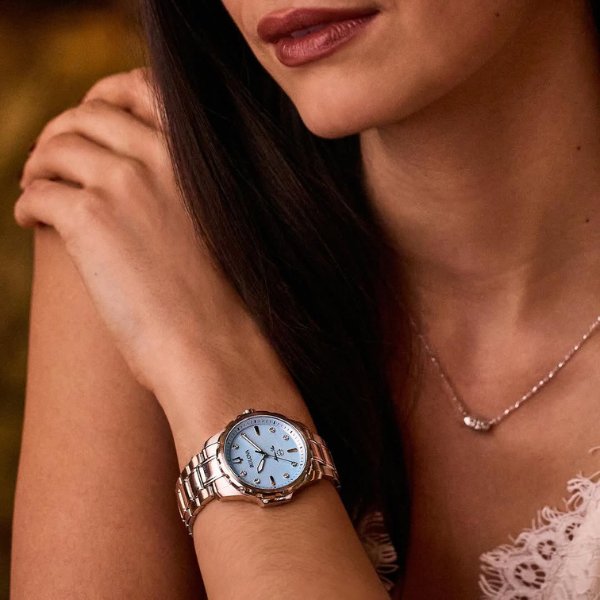
Whether you’re a watch enthusiast or a first-time buyer, choosing the right timepiece often boils down to one crucial decision: automatic vs quartz? Both types have their unique charm, benefits, and drawbacks.
This guide will answer your questions, provide detailed comparisons, and help you make a confident decision.
What is an Automatic Watch and How Does it Work
An automatic watch is a type of mechanical timepiece that operates without a battery. Instead, it is powered by the natural movement of your wrist.
Inside the watch, a small metal piece called a rotor spins as you move, winding a mainspring that stores energy. This energy is then released gradually to power the hands of the watch, keeping it running as long as you wear it regularly.
How Automatic Watches Work
At the heart of every automatic watch is a small yet powerful rotor. This semi-circular piece of metal moves with the natural motion of your wrist. When you wear the watch, the rotor spins, winding the mainspring, a tightly coiled spring that stores energy.
As the mainspring unwinds, it releases energy to the gear train, which transmits that energy to the hands of the watch. The balance wheel helps regulate this flow of energy to ensure the watch keeps accurate time.
In simple terms, the more you move, the more the watch winds itself, keeping it powered without the need for a battery.
Do Automatic Watches Need a Watch Winder?
If you’re not wearing your automatic watch daily, a watch winder can be a practical accessory. A watch winder mimics the natural motion of your wrist, keeping the mainspring wound and your watch running smoothly even when it’s off your wrist.
- - Why Use a Watch Winder? It ensures the watch remains accurate and ready to wear, avoiding the hassle of resetting the time and date.
- - Is It Necessary? Not strictly. If you wear your watch regularly or don’t mind resetting it after periods of inactivity, you may not need one. However, for collectors or those who rotate between several watches, a winder is incredibly convenient.

What makes automatic watches special is the combination of traditional craftsmanship and self-sustaining power. Unlike quartz watches that require a battery, automatic watches rely on the motion of your wrist, making them eco-friendly and hassle-free. They are often appreciated for their smooth second-hand movement and the intricate mechanical workings visible in high-quality designs, making them a timeless choice for watch enthusiasts.
Choose an Automatic Watch if You:
- - Appreciate fine craftsmanship and intricate design.
- - See your watch as an investment or heirloom.
- - Don’t mind occasional servicing to maintain its functionality.
What is a Quartz Watch and How Does it Work
Quartz watches changed the game when they were introduced in the 1960s, offering a reliable, battery-powered alternative to traditional mechanical timepieces. With precision at their core, quartz watches are known for their affordability and accuracy, making them a popular choice for anyone who values a timepiece that just works - without the need for winding or constant attention.
How Quartz Watches Work
Quartz watches operate with a battery that sends an electrical current through a tiny quartz crystal inside the watch. When the current flows through the crystal, it causes the quartz to vibrate at a highly precise frequency - 32,768 times per second, to be exact. These vibrations power a motor that drives the watch hands, ensuring that the time remains consistently accurate.
Because of this crystal-controlled mechanism, quartz watches are incredibly reliable, losing only a few seconds per month, unlike mechanical watches that can gain or lose time each day.
Do Quartz Watches Need Maintenance?
Quartz watches are low-maintenance compared to automatic watches. The main care task is replacing the battery every 1–2 years, depending on usage. Aside from that, keep your watch clean and avoid exposing it to extreme temperatures or moisture. Since they don’t rely on movement, no watch winder is needed - just a simple battery change will keep your quartz watch running smoothly.

It's this precision and simplicity that has made quartz technology the most common form of watch movement today.
Opt for a Quartz Watch if You:
- - Need a reliable, low-maintenance timepiece for daily use.
- - Value affordability and precision.
- - Prefer a lightweight and durable design for an active lifestyle.
Automatic Vs. Quartz: A Side-by-Side Comparison
Common Questions About Automatic and Quartz Watches
1. Which type of watch is better for daily wear?
Quartz watches are better suited for daily wear due to their low maintenance and durability.
2. Are automatic watches worth the investment?
Yes, especially if you value traditional craftsmanship and longevity. Automatic watches often retain or even appreciate in value over time.
3. How often should an automatic watch be serviced?
Every 3–5 years, depending on the brand and usage. Servicing ensures that the movement remains precise and functional.
4. Can quartz watches be used for sports?
Absolutely! Quartz watches are lightweight, shock-resistant, and designed to handle active lifestyles.
Find the Perfect Watch For You at T.H.Baker
At T.H.Baker, we’re passionate about helping you find a timepiece that fits your style and needs. Whether you’re drawn to the sophistication of an automatic watch or the practicality of a quartz one, our carefully curated selection has something for everyone.
Still unsure? Let our expert team help you find the perfect watch that fits your lifestyle and preferences. Visit any T.H.Baker store near you to explore your favourite timepieces up close and enjoy personalised assistance from our knowledgeable team!







